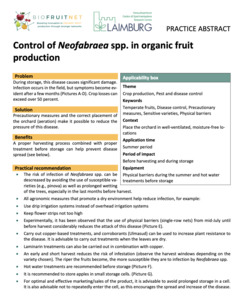{Tool} Control of Neofabraea spp. in organic fruit production (BIOFRUITNET Practice Abstract). Creator(s): Mora Vargas, Alfredo and Kelderer, Markus. Issuing Organisation(s): Laimburg Research Centre. Biofruitnet Practice Abstract, no. 050. (2023)
|
PDF
- Published Version
- English
(Control of Neofabraea spp. in organic fruit production)
442kB | |
|
PDF
- Published Version
- German/Deutsch
(Bekämpfung von Neofabraea spp. im ökologischen Obstbau)
443kB | |
|
PDF
- Published Version
- Italian/Italiano
(Controllo di Neofabraea spp. in frutticoltura biologica)
441kB | |
![[thumbnail of Bildschirmfoto 2024-04-16 um 11.32.42.png]](/45927/7.hassmallThumbnailVersion/Bildschirmfoto%202024-04-16%20um%2011.32.42.png)  Preview |
Image (PNG)
- Cover Image
- English
283kB |
|
PDF
- Published Version
- Latvian/Lettish/Latviesu
525kB |
Document available online at: https://orgprints.org/45927
Summary in the original language of the document
A proper harvesting process combined with proper treatment before storage can help prevent disease spread (see below).
Practical recommendation
• The risk of infection of Neofabraea spp. can be descreased by avoiding the use of susceptible varieties (e.g., pinova) as well as prolonged wetting of the trees, especially in the last months before harvest.
• All agronomic measures that promote a dry environment help reduce infection, for example:
• Use drip irrigation systems instead of overhead irrigation systems
• Keep flower strips not too high
• Experimentally, it has been observed that the use of physical barriers (single-row nets) from mid-July until before harvest considerably reduces the attack of this disease.
• Carry out copper-based treatments, and corroborants (Ulmasud) can be used to increase plant resistance to the disease. It is advisable to carry out treatments when the leaves are dry.
• Laminarin treatments can also be carried out in combination with copper.
• An early and short harvest reduces the risk of infestation (observe the harvest windows depending on the variety chosen). The riper the fruits become, the more susceptible they are to infection by Neofabraea spp.
• Hot water treatments are recommended before storage.
• It is recommended to store apples in small storage cells.
• For optimal and effective marketing/sales of the product, it is advisable to avoid prolonged storage in a cell. It is also advisable not to repeatedly enter the cell, as this encourages the spread and increase of the disease.
| EPrint Type: | Practice tool |
|---|---|
| What problem does the tool address?: | During storage, this disease causes significant damage. Infection occurs in the field, but symptoms become evident after a few months. Crop losses can exceed over 50 percent. |
| What solution does the tool offer?: | Precautionary measures and the correct placement of the orchard (aeration) make it possible to reduce the pressure of this disease. |
| Country: | Italy |
| Type of Practice Tool: | Practice abstracts |
| Keywords: | Temperate fruits, disease control, precautionary measures, sensitive varieties, physical barriers |
| Agrovoc keywords: | Language Value URI English temperate fruits http://aims.fao.org/aos/agrovoc/c_7655 English plant disease control http://aims.fao.org/aos/agrovoc/c_5960 English varieties http://aims.fao.org/aos/agrovoc/c_8157 English barriers http://aims.fao.org/aos/agrovoc/c_b42bc3b7 |
| Subjects: | Crop husbandry > Production systems > Fruit and berries Crop husbandry > Crop health, quality, protection |
| Research affiliation: | European Union > Horizon 2020 > Biofruitnet Italy > Laimburg Research Centre for Agriculture and Forestry of BZ Province European Union > Organic Farm Knowledge |
| Horizon Europe or H2020 Grant Agreement Number: | 862850 |
| Related Links: | https://organic-farmknowledge.org/tool/45927, https://biofruitnet.eu |
| Project ID: | ofk |
| Deposited By: | Basler, Andreas |
| ID Code: | 45927 |
| Deposited On: | 26 Apr 2023 06:35 |
| Last Modified: | 02 May 2024 10:32 |
| Document Language: | English, German/Deutsch, Italian/Italiano |
| Status: | Published |
Repository Staff Only: item control page

 Download Statistics
Download Statistics Download Statistics
Download Statistics
